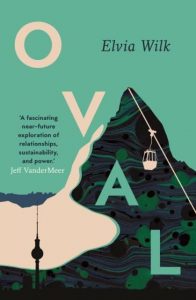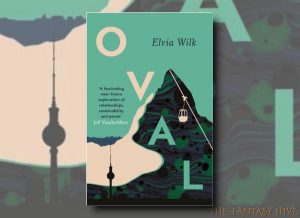OVAL by Elvia Wilk (BOOK REVIEW)
“If there was no secret, there was no reason not to scroll through the messages. They looked at each other’s screens all the time. That was what intimacy meant.”
“’Better to be somewhere where the apocalypse has already happened than sit through another one.’ Laura sipped her coffee. ‘Dystopia takes some time to set in.’”
Elvia Wilk’s chilling debut novel Oval (2022) is the perfect reflection of the neoliberal capitalist paradigm we live in. Wilk expertly dissects the most worrying trends of our current society to tease out a startlingly convincing portrait of where we are heading. Set in a near future Berlin feeling the affects of climate change, Oval asks difficult and probing questions about our personal and collective responsibility to do good, and how possible that is in an era when all our interactions and relationships are quantified and sold. The novel compellingly mixes satire about corporate culture and unflinching explorations of collapsing personal relationships. Wilk’s nightmare vision of a future just around the corner recalls J. G. Ballard at his best, whilst being uniquely attuned to our current anxieties. Originally published in the US by Soft Skull Press in 2019, it is now being published in the UK thanks to Peninsula Press, a service for which all fans of intelligent speculative fiction can be thankful.
 Anja and Louis are a young couple who have just moved into an eco-house on the Berg, Berlin’s new corporate-sponsored experiment in green living built on an artificial mountain. The whole project is sponsored by Finster, the corporation that’s bought up most of Berlin’s land, but the eco-houses are malfunctioning. Anja is a research scientist working for Finster’s research and development department on a project to develop self-growing cartilaginous roofs for houses, under the eye of her ex and Finster’s PR manager Howard. Louis is an artist-consultant working for the NGO Basquiatt, but following the death of his mother, Anja is finding him increasingly difficult. As they drift apart, Louis becomes obsessed with his new project Oval, a pill that will artificially increase generosity through changing the chemical balance in the user’s brain. Louis believes he’s found the solution to Berlin’s spiralling income inequality, but Anja is horrified by the ethical implications. As their house turns against them and they find themselves driven to opposing ethical viewpoints, their relationship further collapses, leaving Anja increasingly isolated.
Anja and Louis are a young couple who have just moved into an eco-house on the Berg, Berlin’s new corporate-sponsored experiment in green living built on an artificial mountain. The whole project is sponsored by Finster, the corporation that’s bought up most of Berlin’s land, but the eco-houses are malfunctioning. Anja is a research scientist working for Finster’s research and development department on a project to develop self-growing cartilaginous roofs for houses, under the eye of her ex and Finster’s PR manager Howard. Louis is an artist-consultant working for the NGO Basquiatt, but following the death of his mother, Anja is finding him increasingly difficult. As they drift apart, Louis becomes obsessed with his new project Oval, a pill that will artificially increase generosity through changing the chemical balance in the user’s brain. Louis believes he’s found the solution to Berlin’s spiralling income inequality, but Anja is horrified by the ethical implications. As their house turns against them and they find themselves driven to opposing ethical viewpoints, their relationship further collapses, leaving Anja increasingly isolated.
Oval uses its close-up view of Anja and Louis’ dysfunctional relationship as a springboard to explore the alienation of modern society. In the high-powered corporate environment of Finster, mingling and networking are key skills and the boundaries between professional life and personal life are no longer clear. Thus all relationships become potential network links or resources to be exploited, which makes Anja and Louis very lonely people. Wilk draws the parallel between this personal alienation brought about by the corporate environment to the more existential alienation we feel in a system where all our interactions, be they between people, family or bureaucracies, are surveyed, quantified and sold to big data so that they can be used to manipulate us in ways we can’t see. In the complex mesh of social media and quantified social interactions that we live in, what does it mean to be a good person? Oval is deeply concerned with this question. Louis believes that the problem is with how we relate to each other on a personal level – if there is a switch in the brain that you could trip to make people more empathetic towards each other, more generous, less selfish, that would solve the horrendous problems of inequality we see in our society. Anja isn’t so sure – Louis’ magic pill is simply a practical iteration of the principles of neoliberalism, whereby corporations outsource responsibility, whether that is environmental or humanitarian, onto the individual whilst refusing to dismantle the social structures that led to this inequality in the first place. In the end, Louis’ Oval is simply the white saviour complex in pill form – a kind of charity centred on making the giver feel better about themselves rather than meaningfully engaging with what the receivers of charity really need or want.
Oval is a biting satire on the modern corporate environment. Finster displays all the worst excesses of modern corporations, particularly in the way that it pretends to be your friend whilst pricing you out of your home. Wilk explores how corporations enter into uneasy relationships with culture and science in order to borrow kudos, hipness and public trust. However culture and science find themselves on the wrong side of a Faustian pact, trading away their respectability for financial security. The corporations on the other side of the table operate outside of any system of ethics or responsibility, meaning that the art or culture is appropriated in a way that is harmful. Both Louis’ work for the NGOs and Anja’s work in biological research ultimately ends up owned by Finster, where it is deployed with scant attention paid to the consequences. Corporations follow the bottom line; in the end, it might be more financially viable for a green living project to fail than to succeed. Wilk brilliantly shows the sheer moral paucity of corporations whose standard practice is to prioritise short-term profit over long-term environmental sustainability.
Oval is a deeply troubling book, one that forces us to critically engage with the social and economic apparatus that surrounds us. Wilk’s great rhetorical move is to bring these concerns full circle back to the personal – how can we meaningfully relate to each other on the micro scale when we cannot do so on the macro scale? As Anja’s personal life unravels, we see how these threads are so closely related. The final section of the book is a glorious descent into a collapsing world overrun with fungus and vegetation, which calls to mind Ballard’s post-apocalyptic environments that reflect his character’s collapsing inner space and echoes Jeff VanderMeer’s use of the Weird to complicate humanity’s relationship with the environment. Oval is a brilliant and uncomfortable work of speculative fiction at its best, and I look forward to seeing what Wilk does next.
Oval is out today from Peninsula Press and available HERE

